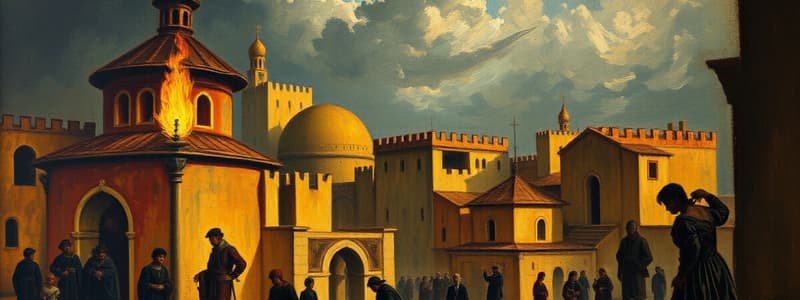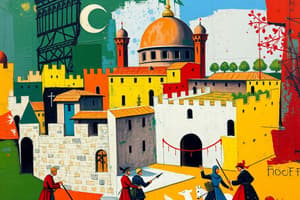Podcast
Questions and Answers
How did the Crusades change life in Europe and beyond?
How did the Crusades change life in Europe and beyond?
In Europe, the Crusades led to economic expansion, increased trade and use of money, undermining serfdom and leading to prosperity of northern Italian cities. They increased the power of monarchs and, briefly, of the papacy. In the Middle East, Muslim regimes united to fight the invaders and began to reunify the region under Saladin.
Why was the invasion of the Byzantine Empire by the Turks significant?
Why was the invasion of the Byzantine Empire by the Turks significant?
It led to the call for help from the Byzantine emperor and thus to the Crusades.
Which of the following are reasons why Europeans joined the Crusades? (Select all that apply)
Which of the following are reasons why Europeans joined the Crusades? (Select all that apply)
- Power (correct)
- Fame (correct)
- Religious zeal (correct)
- Adventure (correct)
- Escaping troubles at home (correct)
- Hope of winning wealth and land (correct)
How did the Crusades accelerate change in Europe?
How did the Crusades accelerate change in Europe?
How did Europe compare with other cultures that existed in 1050?
How did Europe compare with other cultures that existed in 1050?
Who were the Seljuk Turks?
Who were the Seljuk Turks?
How did the Seljuk Turks change the situation in the Middle East?
How did the Seljuk Turks change the situation in the Middle East?
What motivated people to participate in the Crusades?
What motivated people to participate in the Crusades?
Why did the Crusades leave a legacy of religious hatred?
Why did the Crusades leave a legacy of religious hatred?
How did trade lead to a wider worldview of people?
How did trade lead to a wider worldview of people?
Given the emotions caused by the Crusades, how do you think European Christians regarded Muslim control of a part of Europe?
Given the emotions caused by the Crusades, how do you think European Christians regarded Muslim control of a part of Europe?
How was the unified state of Spain formed?
How was the unified state of Spain formed?
Why was the unified state important?
Why was the unified state important?
What did Pope Innocent III claim?
What did Pope Innocent III claim?
What were the Crusades?
What were the Crusades?
What is the Holy Land?
What is the Holy Land?
Who was Pope Urban II?
Who was Pope Urban II?
What was the Reconquista?
What was the Reconquista?
Who were Ferdinand and Isabella?
Who were Ferdinand and Isabella?
What achievements characterized the High and late Middle Ages in learning, literature, and the arts?
What achievements characterized the High and late Middle Ages in learning, literature, and the arts?
How might universities that drew students from many lands affect European life in the future?
How might universities that drew students from many lands affect European life in the future?
How did new knowledge pose a challenge to Christian scholars?
How did new knowledge pose a challenge to Christian scholars?
Why were heroic epics in the vernacular popular with medieval Europeans?
Why were heroic epics in the vernacular popular with medieval Europeans?
Study Notes
Impact of the Crusades
- Economic expansion occurred in Europe due to increased trade and money usage, undermining serfdom.
- Northern Italian cities prospered as monarchs gained power, along with a temporary rise in papal authority.
- In the Middle East, Muslim regimes united against invaders, with Saladin leading the effort to reunify the region.
Byzantine Empire Invasion
- The Turkish invasion prompted a plea for help from the Byzantine emperor, catalyzing the Crusades.
Motivations for Joining the Crusades
- Participants were driven by religious zeal, the promise of wealth and land, escaping domestic troubles, seeking adventure, desiring power, and achieving fame.
Accelerated Changes in Europe
- Crusaders facilitated the exchange of goods and ideas, enhancing trade, and contributing to the emergence of a money economy.
- Availability of ships that transported crusaders promoted further trade and exploration.
European Cultural Context in 1050
- Europe was comparatively less unified and advanced than many other contemporary cultures.
The Seljuk Turks
- This group migrated from Central Asia to the Middle East, converting to Islam and establishing an empire encompassing the Holy Land and former Byzantine territories.
Middle Eastern Changes Due to the Turks
- The Seljuk Turks hindered Christian pilgrims' access to the Holy Land through their conflicts with the Byzantines.
Legacy of the Crusades
- The Crusades fostered a legacy of religious hatred due to atrocities inflicted by both sides and unresolved territorial claims over Jerusalem.
Trade and Global Perspective
- Increased trade introduced Europeans to goods and merchants from foreign lands, expanding their world view.
European Christians and Muslim Control
- Hostility towards Muslim control in Europe was prevalent; Christians sought to expel Muslims from territories they viewed as theirs.
Formation of Unified Spain
- The unification of Spain emerged from the marriage of Ferdinand of Aragon and Isabella of Castile.
Significance of the Unified State
- The monarchy effectively expelled Muslims from Spain and established religious unity through the persecution of non-Christians.
Pope Innocent III
- He claimed supremacy over all rulers during his papacy, emphasizing the Church's authority.
Crusades Overview
- A series of conflicts between the 1000s and 1200s aimed at Christian control over the Holy Land from Muslim forces.
The Holy Land
- Refers to Jerusalem and surrounding areas in Palestine historically significant to Christians.
Pope Urban II
- Initiated the First Crusade during the Council of Clermont, calling Christians to arms.
Reconquista
- A campaign in the 1400s by European Christians to reclaim the Iberian Peninsula from Muslim control.
Ferdinand and Isabella
- Monarchs who completed the Reconquista, driving out remaining Moors and Jews through the Inquisition.
Learning and Cultural Developments in the Middle Ages
- Emergence of universities promoting Greek and Islamic learning led to scholasticism, alongside a revival of literature and Gothic art.
Influence of Universities on European Culture
- They promoted intercultural exchange, blending local customs into a more unified European identity.
Challenges for Christian Scholars
- New knowledge from Aristotle contrasted with the Church's assertion of faith as the ultimate authority, creating tension in intellectual circles.
Popularity of Heroic Epics
- Vernacular literature allowed broader audiences to engage with narratives reflecting their own cultural values and heroic ideals.
Studying That Suits You
Use AI to generate personalized quizzes and flashcards to suit your learning preferences.
Description
Explore the multifaceted impacts of the Crusades on Europe and the Middle East, including economic expansion, political dynamics, and cultural exchanges. Learn how the invasions sparked trade growth and led to significant changes in societal structures and beliefs. Discover the motivations that drove individuals to participate in these monumental events.




